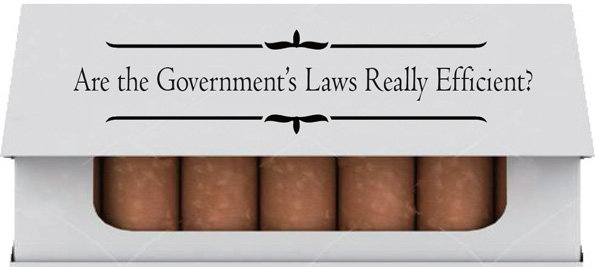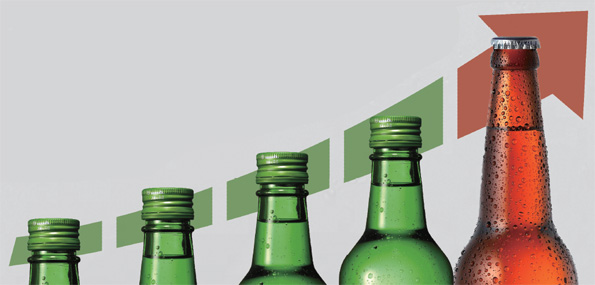
A government plays various roles including protecting its citizens from other countries and making laws for citizens. Recently, the government promulgated laws for maintaining customers’ rights and promoting people’s health. However, some of the laws are being criticized for having a lot of problems. There are questions of whether the government’s indiscriminate legal regulations have efficacy or not.
One of the controversial laws was the introduction of an inflation indexation system. On January 1st, 2015, the government raised the cigarette prices for the sake of people’s health. According to the Ministry of Strategy and Finance (MOSF), in 2015 when the cigarette prices were raised, 13.1 billion packs of cigarettes were sold in the first half of the year, a decrease of 7.4 billion packs, compared to the first half of 2014 when people bought 20.5 billion packs. However, the effectiveness on decreasing smoking weakened as 17.9 billion packs of cigarettes were sold in the first half of 2016. Besides, when the government promulgated the law, panic purchases of cigarettes became a problem.
Another problem with the inflation indexation system is that tobacco smuggling increased rapidly. According to MOSF, the monetary value of convicted tobacco smuggling cases was about 140 billion won from 2012 to 2016. Annually, the number of cases of cigarette smuggling reached 41 cases in 2012, 81 cases in 2013, and 88 cases in 2014, but it increased rapidly to 593 cases in 2015 and 572 cases in 2016.
Also, in November 2016, the government inserted health risk warnings and pictures on cigarette packs to encourage people to quit smoking. However, new packs with alternate cases that block the warnings came out. These are on sale on the internet with advertisements saying, “Do you have a disgusting picture on your cigarette pack? Attach the manner label on the cigarette packs now.” It ignores the government’s intentions. Consequently, unlike the government’s intention to reduce smoking through the cigarette pack’s warnings, the warnings became useless. Despite this situation, there are no laws that control or punish those kinds of goods. A quit-smoking campaign noted that the intention of putting warning pictures on cigarettes became useless.
A CBNU student, Min Tae-kwan(’14, Dept. of Civil Engineering), said, “I think increasing cigarette prices is a very good legal step. While I was studying abroad in America, America’s cigarette prices were about 4~5 times higher, compared to Korean cigarette prices, so I thought that I had to quit smoking because of financial issues, and I actually quit smoking. I guess the government didn’t expect the inflation indexation system and other laws designed to decrease smoking might actually create a market for new products, such as alternate cigarette labels. I feel sorry that the government's original intention failed.”
A CBNU student, Park Gi-beom(’16, Dept. of Applied Biotechnology), also said, “Every time we took smoking prevention education from our elementary school, we learned the risks of smoking from seeing photos or videos of patients suffering from the results of smoking. However, if it had been effective, the proportion of adolescent smokers would be decreasing. On the contrary, adolescent smokers are increasing. Considering this, it is hard to see the effects of preventing smoking by showing visual images.”
In January, 2017, the government enforced a policy for recovering the rights of consumers and decreasing the prices of alcohol. The new policy is increasing the deposit money that people can receive from returning an empty bottle. A deposit of an empty bottle of soju increased from 40 won to 100 won, and beer bottles increased from 50 won to 130 won. The deposit refund system’s main purpose is to recover the consumer’s rights by giving the deposit back to the consumers and to save resources by using empty bottles.
However, after enacting the policy, unlike the original intent, the price of alcohol increased and became more expensive for consumers because the liquor industry increased the price of alcohol and restaurants also increased the selling price. For example, the Hite Jinro Company increased the factory price by an average of 6.33% for all beers late last month. Oriental Brewery Company increased its main products’ factory prices by over 6% on average too. The BGF Retail Company, which manages the convenience store named CU, increased Chamisul’s soju price from 1,600 won to 1,700 won, and Cass’s price rose from 1,850 won to 1,900won.
Also, this policy triggered some panic-buying of empty bottles to take advantage of the trade-in profit.
Regarding this, an official sales manager at the Chungbuk Soju Corp, Kim Jong-ok, answered, “After the policy, the empty bottle collection rate lowered due to the panic buying of empty bottles, so now we are importing empty bottles from China to keep up with daily output.”, showing that increasing a deposit price can actually damage manufacturers.
As such, the government’s policy for protecting people’s rights and for the sake of promoting health became a controversial issue because they didn’t consider the reactions to the laws. Questions have arisen whether the government’s indiscriminate legal regulations, such as the warning labels, increasing cigarette prices or increasing the deposit money of empty bottles, have effectiveness. I hope the government will learn a lesson from those cases and make better regulations for the people.
By Kim Jae-wan
jw37@cbnu.ac.kr
By Kim Chae-hyeon
ch38@cbnu.ac.kr


 All
All Feature
Feature






 Kim Jae-wan & Kim Chae-hyeon
Kim Jae-wan & Kim Chae-hyeon











